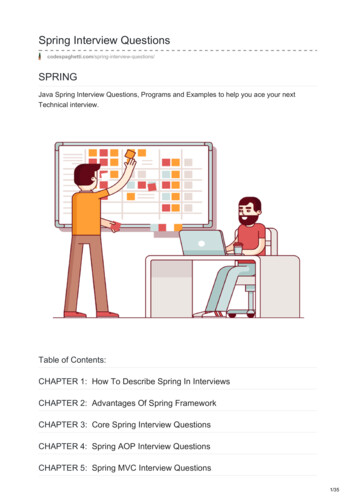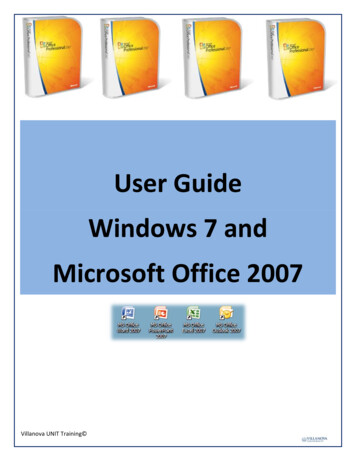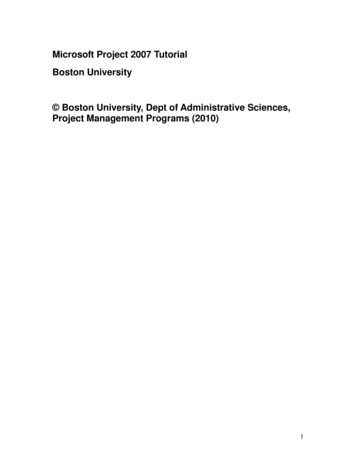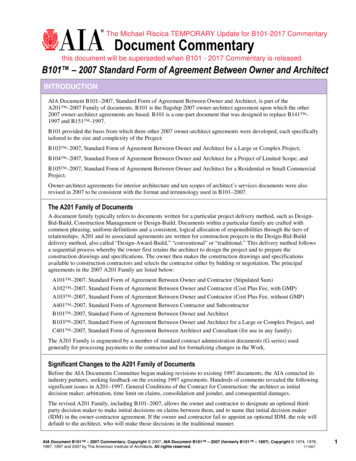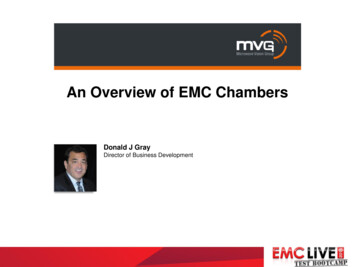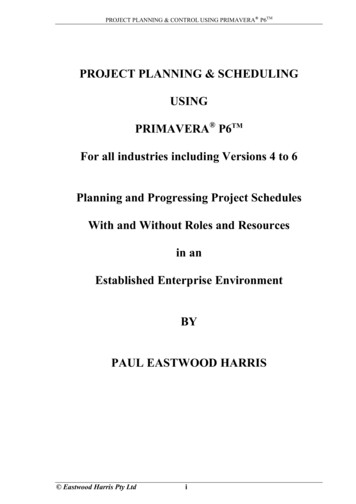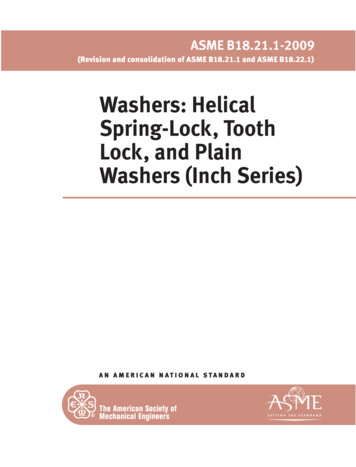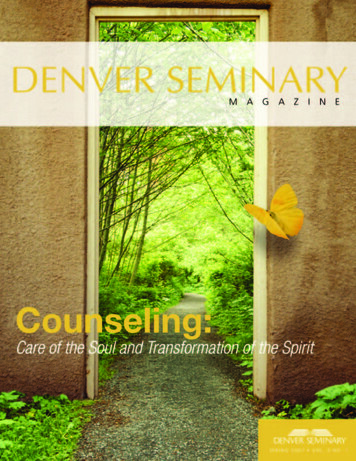
Transcription
contents5Mother Lode: Mining for theGod of Gracetable of contentsdepartments3Campus News7Student Life8Alumni11Educational Programs15Advancement17Resources18Chancellor’s Cornerby Dr. Joan Burgess WellsDr. Fred Gingrich discusses Christian counseling at DenverSeminary, one of the largest and most respected master’slevel Christian counseling programs in the country.by Dr. Fred GingrichIRA Tax Law Enables Stewardsto Make Larger GiftsDENVER SEMINARY MAGAZINE STAFFVol. 3, Number 1, Spring 2007Executive Editor:Editor:Editorial Assistant:Design:Editorial Committee:Photography:9Reflections161SPRING 2007Dr. Joan Burgess Wells discusses the treatment journeyof a patient who learns about the presence of God inlife’s sorrow.Gary HoagCynthia McDowellHugh FowlerKristi WimbishKBW Graphic DesignMelanie EagarTaryn JamesLuanna TraubertJason Jones PhotographyIgnite ImagesIf you are age 70 or older, new legislation now allowsyou to make cash gifts totaling up to 100,000 in2007 from a traditional or Roth IRA to qualifiedcharities such as Denver Seminary without incurringincome tax on the withdrawal.Denver Seminary Magazine is published free of charge fourtimes per year by Denver Seminary for the benefit ofstudents, staff, faculty, mentors, alumni and friends.Address corrections or subscription requests can be sent to:Denver Seminary Advancement Office6399 S. Santa Fe Dr., Littleton, CO 80120or e-mailed to info@denverseminary.edu800.922.3040 or 303.761.2482Copyright 2007 Denver Seminary. All rights reserved. Nomaterial may be reproduced without the written permissionof Denver Seminary. All Scripture, unless otherwise noted, istaken from the New International Version, Copyright 1978 bythe New York International Bible Society, used by permission.Denver Seminary admits qualified students of any race,gender, color, and national or ethnic origin.Denver Seminary Magazine (USPS 563-400) is published byDenver Seminary, 6399 S. Santa Fe Dr., Littleton, CO80120. Periodical postage paid at Englewood, CO andadditional mailing offices.in your churchPg. 5This feature article traces one woman’s journey through grief and loss. How doesTerra’s journey help you understand the spiritual formation process of those suffering inyour church body?Pg. 9Did you know that an extension of Denver Seminary’s counseling program is ourShepherd’s Gate Counseling Clinic? This low-cost clinic is available to the community.For more information or to schedule an appointment, please call 303-762-6987.Pg. 17Pick up one of these recommended resources on counseling for an introduction to the topicas you consider soul care for those in your congregation.Pg. 20Consider attending our faculty book signing. This would be a great way to meet some ofthe Denver Seminary faculty and pick up some good reading materials in the process!
.And what does the Lord require of you? To act justlyand to love mercy and to walk humbly with your God.Micah 6:8 NIVpresident’s messageThis issue of the Denver Seminary Magazine highlights our degree programs in counseling. Whileour Master of Arts in Counseling (licensure) might be the most traditional degree pursued by ourstudents with an interest in a counseling ministry, we also offer the following: a Master of Divinitywith a specialization in pastoral counseling; Master of Divinity with a specialization in chaplaincy;and Master of Arts with a major in counseling ministries. We are also excited about a new specialization that will train accredited school counselors for private and public schools in Colorado. In all ofthese programs, our goal is to equip counseling leaders who will think biblically, live faithfully andlead wisely for a lifetime in whatever vocational setting they may find themselves. We humblyacknowledge that the Holy Spirit, using God’s truth, love and grace, is the One who changes lives.Through His guidance and empowerment, our graduates have the privilege and responsibility ofhelping people and transforming some of our societal injustices for the sake of the oppressed andunderrepresented. What an excellent calling, to assist others to live justly, to give and receive steadfast love, and to live their lives for the sake of others and in the fullness of the love of Jesus Christ.This feature includes articles by Dr. Fred Gingrich, the new counseling department chair effectivethis summer, and long-time counseling faculty member Dr. Joan Burgess Wells. We also announcethe hiring of Dr. Dieumeme Noelliste as the Director of the Vernon Grounds Center for Public Ethicsand Professor of Theological Ethics, beginning in August 2007.Thanks for your partnership with Denver Seminary. Please pray for us, serve with us as a mentor,recommend your friends to join us, and even take some classes yourself!With appreciation,Craig2SPRING 2007In response to their unfaithfulness to God, the people of Israel asked what the proper acts ofcontrition and repentance were. Under the inspiration of the Holy Spirit, Micah listed three relationalcommitments that are just as relevant to us today. First: to follow God by acting justly in ourrelationships with other humans as God has done with us, especially those oppressed andsuffering injustice. Second: to love mercy—better understood as expressing steadfast love towardGod and others. To walk humbly with God is Micah’s third requirement: seeing ourselves and othersas God does while acknowledging Christ’s lordship in the manner in which we live our lives. Jesusreaffirms these responses in the New Testament when he explains the greatest commandments as“Love the Lord your God with all your heart and with all your soul and with all your mind.” And “Loveyour neighbor as yourself.” Matthew 22: 37ffpresident’s messageby Dr. Craig Williford
campus news : winter 06Rev. Robert Jones Appointed Vice President of Student ServicesDenver Seminary is pleased to announce that the Reverend Robert Jones has accepted our invitation toserve as vice president for student services at Denver Seminary. Prior to coming to Denver Seminary,Robert served as vice president of enrollment management at Colgate Rochester and at Asbury TheologicalSeminary. At Asbury, he provided leadership during their rapid increase in enrollment while improving theacademic quality of incoming students.Robert’s commitment to Christ, his family, and the church provides a solid foundation for his service.Additionally, his theological training—including previous experience as a pastor—coupled with his extensiveexperience and expertise in leading student services provides the breadth and depth of firsthand knowledgeneeded for leading our student services department. Robert will assume his duties in April 2007.Vice President for Student Services Robert Jonescampus newsRobert and his wife Marcia have two children, Jonathan and Sharayah. Please join us in welcoming them to the Denver Seminary community!SPRING 20073Seminary Alumnus Speaks atConference for World Christians1997 M.Div. alumnus and native African Anthony(Tony) Weedor served as the speaker for the 2007Conference for World Christians, held Jan. 29 and30, 2007. This annual conference challenges thestudents and community of Denver Seminary tomaintain a global perspective and encourages globalministry involvement. Representatives from severalmission agencies were on campus both days.Weedor was born and raised in Liberia, but fled hiscountry during the civil war in the 1990’s, walkingfrom Liberia to the IvoryCoast with his wife andchild. Currently heserves as the director ofCenterpoint International,a ministry called toreach Muslims and raiseup leaders in the Africanchurch. Tony’s messages were titled“Overview of the ChurchGoing Home” and “TheHomeward Bound –Asia, Latin America,Africa.” We invite you tolisten to both of thesemessages. To do so,please go todenverseminary.edu/worship/media.Tony Weedor, Conference for World Christians speakerBiblical Studies Conference Addresses“Christians and the Future”The annual Biblical Studies Conference was Feb. 9-10, 2007. The topic thisyear was Christians and the Future: the Bible and Premillennialism.The recent popularity of books and movies such as the Left Behind seriesdemonstrates that interest in Biblical prophecy and the future remains strong.At the conference, scholars of theology and the Bible joined to discuss therole of premillennialism and the Bible’s account of the future. Our commitment to globalization allows us to examine these questions in larger contextssuch as that of worldwide Christianity. As such, the topic addressed thesignificance of premillennialism for broader questions of Christian life and mission.Speakers for the weekend included Dr. Craig Blomberg, DistinguishedProfessor of New Testament; Dr. Hélène Dallaire, Associate Professor of OldTestament; Dr. Richard S. Hess, Professor of Old Testament and SemiticLanguages; Dr. Don Payne, Assistant Professor of Theology and Ministry; Dr.Sung Wook Chung, Associate Professor of Christian Theology; and Dr. OscarCampos, Director of Graduate Studies, Seminario Teológico Centroamericano,Guatemala.
International Christian Mentoring Network LaunchedPrior to the 2006 National Conference on Mentoring, held at Denver Seminary, approximately 25 conference attendees from around the world came together to discuss the possibility of an internationalorganization designed to support Christians involved in the ministry of mentoring. There was a clearand strong consensus that the need exists and the time is right. Six of these individuals subsequentlyvolunteered their time to serve on the launch team of the International Christian Mentoring Network(ICMN). The launch team (now also serving as the interim board) consists of members from Arizona,California, Colorado and Northern Ireland. In Dec. 2006, the network was legally incorporated and iscurrently in the process of securing non-profit status. The website (www.tri-mentoring.org) is underdesign, nearing completion and should launch in the spring of 2007.The ICMN will participate with Denver Seminary in sponsoring and organizing the bi-annual InternationalConference on Mentoring to be held in Denver during the Spring of 2008. We look forward to hearingfrom those who may be interested in joining the ICMN and would value your input on how this organization can be of service to you in your mentoring ministry. Please contact Nicolette Johnson in theTraining and Mentoring Deparment at nicolette.johnson@denverseminary.edu or at 303-762-6917.Dr. Rick Hess and Rabbi David Zucker Address Mideast Crisisat Women’s ForumOn Feb. 8, 2007 the Women’s Forum tackled a hot topic of today in discussing the Mideast crisis. The largest groupto date of 100 women came to grapple with the ongoing conflict between Israel and Palestine. Old Testament professor Dr. Rick Hess introduced this issue by sharing some of his personal experiences from living in Israel for 15months in the mid-80s. He noted the complexity of the crisis in the distinction of so many different groups involved:based on religion (Jewish and Muslim faith), geography (Israel and Palestine) and heritage (ethnic Jews vs. ethnicArabs). Even within Israel and Palestine, respectively, there are serious divisions to be found such as conflictDr. Rick Hess and Rabbi David Zuckerbetween ultra-orthodox and secular Jews, Arabs who are Israeli citizens, and Christians living in Palestine. Localrabbi Dr. David Zucker joined the conversation in sharing the history of the Israelis and Palestinians, including the myriad of conflicts between the twofor the past 150 years. In the end these are two irreconcilable religious groups coming from great historical traditions vying over the same piece ofland. Clearly, there is no easy solution.The Women’s Forum is a series of stimulating lectures and discussions designed for women in our community to wrestle with relevant issues oftoday, cultivate their own worldviews and pursue a deeper relationship with Christ. Our next event will be April 24 with Elisa Morgan, president ofMOPS International. Join us for an 11 a.m. chapel service, followed by a women-only discussion from 12-1pm. To learn more about the DenverSeminary Women’s Forum, please contact Sarah Rymer at 303-762-6884 or visit our website at www.denverseminary.edu/events/womensforum.4SPRING 2007The ICMN website will provide a variety of helpful general resources to all who visit, but will alsoinclude a fee-based member organization. Membership will allow further access into the websitewhere members can participate in forums related to mentoring in various institutional contexts, accessarticles and cutting-edge research on mentoring, participate in threaded discussions related to variousmentoring topics and network with others around the world with mentoring experience and insight toshare. Annual membership fees are projected to be 50 for individuals or 125 for institutions (threefrom the same organization). The Apostle’s Creed will serve as the confessional basis for membershipin the ICMN.campus newsThe ICMN defines “mentoring” as “an intentional relationship that includes God, mentor and menteefor the purpose of growth.” The vision for the ICMN is to encourage and resource the global community in the practice of Christ-centered, life-transforming mentoring. The mission of the ICMN is to pursuethis vision by: Demonstrating the importance and potential of mentoring Encouraging mutual support and networking within the Christian mentoring community Identifying, developing and disseminating mentoring resources Providing training and learning opportunities for mentoring Promoting reflection, evaluation and research related to mentoring
MOTHER LODE: Mining for the God of Graceby Joan Burgess Wells, Ph.D.Professor of CounselingfeatureAs clinicians, we sometimes find that thepsychological and spiritual coherence of ourtreatment journey with a client comes intogreater focus in the aftermath of the experience. This may be especially true if the therapeutic process has spanned several yearsand involved multiple layers of work. Suchwas the case of Terra, a 29-year-old newlymarried client whose initial presenting needwas grief and loss therapy. Terra’s mother,still in her 50’s, had been diagnosed withterminal cancer and was given only monthsto live. My initial diagnosis of uncomplicatedbereavement for an obviously competent,high functioning young woman seemedaccurate and straightforward. Terra, however, was to become one of the most challenging and interesting clients of my career.SPRING 20075The major life adjustments of a new marriage, a recent move from another state,and a challenging professional positionwere reason enough for Terra’s disequilibrium. I was soon to discover, however, thather life story was a layered narrative oftrauma and deprivation. The crisis of hermother’s imminent death had brought intokeen relief a clinical picture replete withdevelopmental fault lines, abandonment,depression, betrayal and a deep, pervasivesense of personal inadequacy.Terra had become a Christian in highschool. On the one hand she ferventlydesired the comfort and direction of God tosee her through this time of personal crisis.Yet I found that her internalized concepts ofGod reflected a punitive, highly judgmentalbeing. My work with Terra was to encompass the provision of a holding environmentand the reconfiguration of an internal map.The re-framing of her understanding of Godwas a significant goal. Various writers haveprovided valuable discussions of the intricately interwoven process of the “selfbecoming” and the tandem development offaith in the individual. The construction ofthe self and the concurrent unfolding of faithdevelopment find their roots in the quality ofthe parent-child interaction in earlychildhood. The subsequent reworking andredefining of the faith experience must occuracross the developmental years. A loving,nurturing environment for the child is crucial.The Early YearsTerra’s mother’s life was plagued withchronic mental illness and periodic hospitalizations. Terra’s only sibling was an olderbrother with mental retardation. Terra’sfather left the home when the mother waspregnant with Terra. His re-entry into her lifein her teenage years would add anotherwrinkle to a complex clinical picture.Terra’s depiction of her mother’s parentingrevealed a pattern of inconsistency. Shewas sometimes hovering and overprotective, micro-managingthe details of Terra’s lifeexperiences. An anxiousconcern for Terra’s performance—in music, in equestrian training, and in school,along with a preoccupationwith social image were paradoxically accompanied by ashocking neglect of emotional and even physicalsafety needs. Terra had vividmemories of finding herselfin circumstances markedlyinappropriate for herchronological age. She wasoften placed in charge ofher brother, Michael. Terra’sexaggerated sense of duty,concern for others at herown expense, and generalsense of hyper-vigilancewere prominent themes ofher growing-up years. Terralost a piece of her childhoodin the surrogate parent rolein which she was cast, andin a myriad of other earlyexperiences. Among Terra’s earliest memories was the experience of being left alonein the house. Abandonment was anothersignificant theme from Terra’s early years.Terra also related episodes of her mother’sverbal rage and ranting tirades aimed atTerra’s imperfections and infractions. Terrareported that she would remove the glassesthat she wore as a child in order to renderthe visual image of her screaming motherless distinct during these outbursts. Hermother’s expectations afforded no wiggleroom or margin of error for the growingchild. The person of this formidable motherloomed large. Terra became a pleaser.The Adolescent and Young Adult YearsThe stage was set for the overlay of thefalse self spoken of by various theorists.Terra’s emerging self struggled against agrowing child’s most poignant terror, theloss of love. Terra knew only too well whatshe was permitted to feel and think and be.Instead of possessing a sense of “confidentexpectation,” Terra would negotiate theprocess of individuation on wobbly legs.
Joan Burgess Wells, Ph.D.Grief’s Bravehearted QuestWhen Terra became my client she had beenmarried for only six months. Terra had founda professional position in a medical facilityand the couple’s new life together was busybut manageable. Tragically and abruptly,Terra brought substantial personal competencies to our therapeutic work. She had anatural capacity for reflection and introspection. She was highly motivated as a client,and her resources included the ability towrap language around her internal experiences. Yet, I perceived that the gaping holeopened by her mother’s illness contained anameless dread, a kind of content-less griefthat transcended the immediate impendingloss. The respect that she enjoyed as askilled professional belied her impoverishedinner state. She quickly developed a childlike dependency on me and lived in virtualterror that I would “dump her as a client.” Ifmy voice became too adamant in our dialogues, she would remove her glasses, asshe had done in her childhood when subjected to her mother’s fury. Her sense ofshame and self-blame in regard to almostanything we discussed were intense. I jokingly told her once that I knew the details ofall of her hair barrettes. (She would bury herface in her knees when she was overcomewith feelings of shame and I was affordedfrequent views of the top of her head.) Terraneeded to test my constancy. Each weekwhen I greeted her, I observed a searching,anxious look in her eyes. She was checkingout the climate, as I’m certain she constantlydid as a child. “Are you mad at me?” wasoften the question du jour.Terra’s mother lived for almost exactly oneyear from our initial therapy session. Again Iwas constantly struck by the incongruencebetween my client’s personal competenceand her own internal sense of inadequacy.She demonstrated much wisdom and skill
Denver Seminary Magazineis published free of charge four times per year by Denver Seminary for the benefit of students, staff, faculty, mentors, alumni and friends. Address corrections or subscription requests can be sent to: Denver Seminary Advancement Office 6399 S. Santa Fe Dr., L
